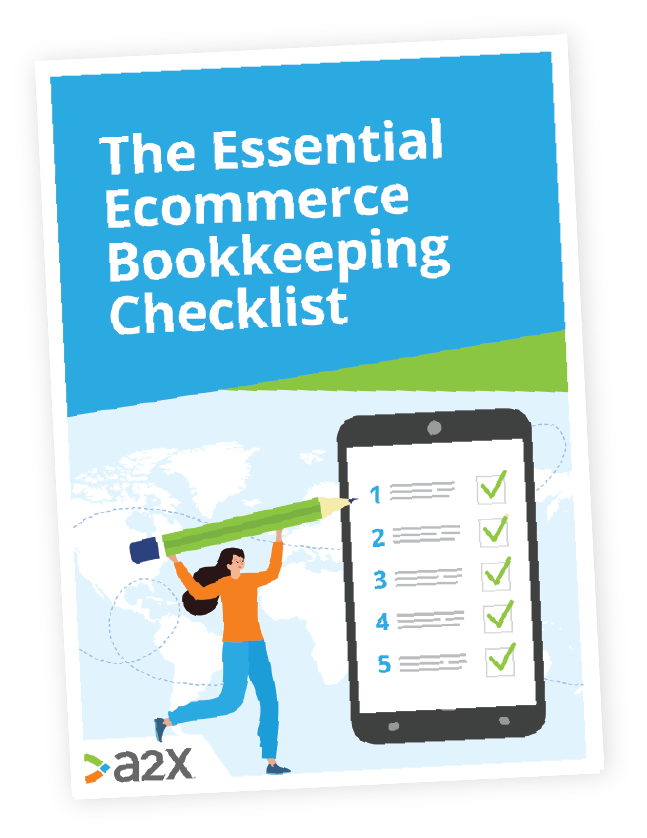
Here’s Why It’s Important to Document Your Ecommerce Bookkeeping Processes
Looking for a simple way to set your business up for growth?
Documenting your processes could be the answer.
Having a record of essential tasks increases productivity and consistency. And it’ll help your business to scale.
This guide shows you why and how to record your processes with the help of our free bookkeeping checklist.
We also hosted a webinar about how to use the checklist, joined by Juliet Aurora from AIS Solutions, Brittany Brown from LedgerGurus and Joe Carufe from KarbonHQ.
You can check it out here, or read their expert insights below.
In this guide to documenting your processes, you’ll learn:
Table of Contents
Want to feel completely confident in your ecommerce bookkeeping?
Businesses that document their processes grow faster and make more profit. Download our free checklist to get all of the essential ecommerce bookkeeping processes you need every week, month, quarter, and year.
Download it here
Why it’s important to get your bookkeeping right
“Ecommerce businesses are fast paced, with a lot of transactions, a lot of inventory, and a lot of complexity as it relates to accounting and bookkeeping.”
- Geoffrey Gualano, Head of Marketing, A2X.
Ecommerce bookkeeping can be complex.
And it only increases in complexity the more you sell.
Sales tax, inventory, and sales channels are all vastly different to brick and mortar retail stores.
It can take time to get your head around the specifics of ecommerce bookkeeping, but the benefits are worth it.
How ecommerce bookkeeping benefits your business
There are a number of key benefits of neat, accurate, documented bookkeeping.
Pay the correct amount in tax (and avoid fees for non-compliance)
Sales tax is one of the biggest pain points for ecommerce sellers.
“It’s hard enough to understand your tax compliance when you’re only dealing in one state or province. With ecommerce, you’re selling your product across multiple states, multiple provinces, sometimes multiple countries.”
- Juliet Aurora, CEO, AIS Solutions.
With good ecommerce bookkeeping you can get sales tax right.
And getting it right will save you money.
You won’t be overpaying, and you’ll avoid any fees or fines from underpaying.
Increase the value of your business
“If you’re looking to help a business sell, you need good bookkeeping… [this] improves the overall profitability metrics of a business, which allows it to sell at a higher price.”
- Brittany Brown, CEO, LedgerGurus.
Potential buyers want to check out your finances to see how your business is performing.
Keeping your books tidy and using the right accounting method keeps buyers happy and can even increase the value of your business.
See how your business is performing
Good bookkeeping makes it easy to see how well your business is doing.
It gives you visibility over key performance indicators, like your most profitable channel, product and region.
Once you know what’s going well, you can do more of it!
And the things not going so well?
You can identify and fix them.
Get help from the experts
It takes patience, experience and organized documentation to get your ecommerce bookkeeping right.
But you don’t have to do it alone.
Working with ecommerce accounting professionals like LedgerGurus and AIS Solutions gets you access to valuable expertise.
And tools like A2X and our Essential Ecommerce Bookkeeping Checklist will help you put the correct procedures in place.
Why you need to record your processes
“Often you ask a business, ‘Where are your processes?’. They’ll say, “They’re right here, in my head. They come with me on vacation or when I’m sick.”
- Joe Carufe, Director of Services, KarbonHQ.
It’s crucial to have the right processes in place.
But for maximum growth, you need to make sure they’re clearly documented too.
How recording your processes helps you scale
“When you put systems and processes in place you’ve created a business, not just a job for yourself.”
- Juliet Aurora, CEO, AIS Solutions.
It takes the pressure off you
When processes only exist in your head, there’s a lot of pressure.
It’s up to you to remember what to do, when, and how. And if you forget, there’s no one else to pick up the slack.
Recording your processes takes the pressure off.
You’re no longer the last line of defence for your business’s success.
It saves you time
Bookkeeping processes can be time-intensive.
Having a clear process to follow speeds things up, even when you’ve done something hundreds of times. It also makes it easier to delegate tasks to other team members.
You’ll end up with a lot more time to focus on other parts of your business.
It improves results
Following recorded processes increases the accuracy of your bookkeeping.
Tasks get completed in the same way every time, which keeps results consistent and cuts down on errors.
You can share the load
With your processes recorded, you’re no longer reliant on one person (you!) to remember everything.
It’s easier to onboard new team members as your business grows. And if someone leaves, your best processes don’t leave with them.
You can even take a vacation, knowing your accounts will stay in tip top shape.
Imagine that…
Tips for recording your processes
Here are some things to keep in mind as you start recording your processes:
- Scaling and size dictate level of detail
The size of your business can help you decide how detailed your instructions need to be.
“If you’re scaling like crazy… You’re going to want more granularity in the tasks, so that it’s easier to follow step by step. If you’re more owner-operator, you can get away with less granularity.”
- Joe Carufe, Director of Services, KarbonHQ.
To put it simply, less scale = less detail, more scale = more detail.
- Get the team involved
Consult key stakeholders as you put your documentation together, especially those who will be implementing the tasks.
- Include clear ownership with clean hand-offs
Make it clear who will be responsible for each process and how to hand it off, step-by-step.
- Lead by example
Show, encourage, and remind team members to always be following and optimizing your process.
- Be patient
Good habits can take months to form, stay the course to extract the fruits of your labor.
- Optimize, optimize, and optimize
Revisit the process with team members often to update your process.
- Leverage technology
Identify laborious tasks that are prime for automation and explore solutions to help increase your efficiency.
“I’ve come from the space of manually doing journal entries to try to match point of sale data, so A2X is up there on the list of very cool tech that saves a bunch of time.”
-
Joe Carufe, Director of Services, KarbonHQ.
-
Hold yourself accountable
Use a tool like KarbonHQ to hold yourself and your team accountable to processes.
- Have someone check your work
Have a newbie follow your process to find out what’s still in your brain.
“The person doing the work has so much in their head that they don’t even realize it. Get them to document the process, then have someone else follow it. You’ll find the gaps of what’s been missed.”
- Juliet Aurora, CEO, AIS Solutions.
A checklist makes it simple to document your bookkeeping tasks
Recording your processes takes lots of effort, especially when you’re busy running your business.
That’s why we’ve done it for you!
Our Essential Ecommerce Bookkeeping Checklist documents all the processes you need as an ecommerce seller:
-
What to do
-
How to do it
-
When to do it
-
Responsibilities
-
Priorities
Easy!
No, it really is.
How to use the checklist
The checklist is a ready-made process document.
You can follow the instructions to complete the tasks yourself with greater efficiency.
Or you can hand them over to more appropriate team members.
Start by looking at the high priority tasks. These are the ones that keep your business running and cannot be missed.
Here’s an example of a high priority, weekly task to be completed by a general bookkeeper or controller:
Enter all inventory bills into accounting system or inventory app
When you purchase inventory, it’s important to pull this information into your tech stack.
If you’re using an inventory app that’s integrated with your accounting system, pull the bills into here. Otherwise, you can bring your inventory bills into the accounting system and categorize it as purchases.
Once your high priority processes are in place, you can start looking at the next phase of tasks.
Download the checklist for free
We want you to start experiencing the benefits of well-documented processes as soon as possible.
Want to feel completely confident in your ecommerce bookkeeping?
Businesses that document their processes grow faster and make more profit. Download our free checklist to get all of the essential ecommerce bookkeeping processes you need every week, month, quarter, and year.
Download it here

